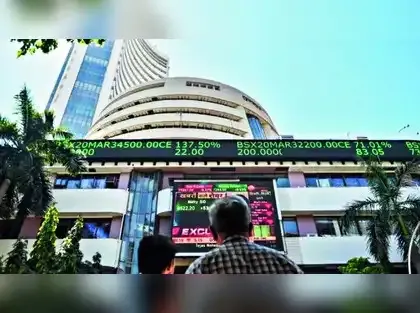Ideally, India's emergence as the largest derivatives market in the world should have been a cause for cheer. But, instead, it has triggered a debate whether the nation's capital market has become a gambling den, instead of a robust institution that is supposed to ensure effective - and timely - transfer of capital from the less-efficient to those companies that can put that scarce raw material to productive use.
From billionaire banker Uday Kotak to Sebi chairman Tuhin Pandey, everyone is highlighting the excesses in equity futures and options market that have the potential to wipe out small investors. The Jane Street episode, where the regulator penalised the fund management company for manipulating the market, is evidence of how unsophisticated retail investors are taken to the cleaners by masters of algorithmic trades.
If India's stock market - which has a market capitalisation of less than a tenth of the US market - has a share of 80% in global index and stock options contracts, something is abnormal. Ironically, the current derivatives gambling den was facilitated with an amendment to the Securities Contracts (Regulation) Act to overcome laws that classified futures and options under gambling.
Ease of trading has brought the common man trader and fund management companies with deep pockets on the same platform. While that may appear unfair, but that's what makes the market deep, and has made India the sought-after one for private equity funds that can sell billions worth shares in a matter of minutes, something few in the world offer.
Many, including Sebi whole-time member Ananth Narayan, want to wean away speculators to cash market from derivatives. 'We must look for further ways to further deepen our cash equities markets,' Narayan said recently at a CII conclave. There are many ideas floating around, including a return to the much-abused badla trading, a crude form of speculation, and to promote individuals speculate in the cash market.
Hopes of reviving badla may be romantic. Promotion of speculation in the cash market may be reasonable. But the cost of trading needs to fall, and regulations eased.
Sebi's missionary zeal transformed the equities market from an opaque broker-run club that many feared to tread into a transparent electronic market. But the evolution has changed dynamics of the market too, opening up room to promote cash trades affordable.
Why are derivatives magnets to speculators? Because of the value of securities, one can own in it is multiples of the cash segment and longer periods. An investor has to pay up 100% to buy a security in the cash market. The same could be done in futures with just about 10-25% of the value. In options, it is as little as 1% of the notional value.
Brokerages have to stump up capital or margins to exchanges, which can be cash or shares. This list of securities that qualify for it is a portion of what is traded and the newly listed, but active are left out.
Some of the margin requirement rules are two decades old, when the market and credit risk were different. When settlements were done once in 15 days in the 90s, there was considerable risk of defaults. But it moved to T+5. Now, it's just T+1. The risks aren't the same.
Taxation, too, weighs on cash trades that needs alignment. The securities transaction tax (STT), which is higher for cash trades, needs to be brought down, either on a par with derivatives, or lower. Furthermore, intraday settlements of cash trades are treated as speculative business income, attracting higher rates than short-term and long-term capital gains tax.
It's not just GoI that gains from retail investor losses in derivatives. Even the regulator gets a share of the pie in the form of regulatory fee. To promote cash trades, the regulator may sacrifice the fee it gets as it does it in the agricultural commodities market where there's no such fee.
The cash segment where average daily trades were just a few hundred crores at the turn of the century, went past ₹1 lakh cr combined on stock exchanges despite the adverse conditions. Even in this, stocks deliverable is less than half in most active companies' shares.
Speculators are open to be active wherever they could make a quick buck. But it must be relatively affordable. For that, Sebi and GoI need to incentivise.
From billionaire banker Uday Kotak to Sebi chairman Tuhin Pandey, everyone is highlighting the excesses in equity futures and options market that have the potential to wipe out small investors. The Jane Street episode, where the regulator penalised the fund management company for manipulating the market, is evidence of how unsophisticated retail investors are taken to the cleaners by masters of algorithmic trades.
If India's stock market - which has a market capitalisation of less than a tenth of the US market - has a share of 80% in global index and stock options contracts, something is abnormal. Ironically, the current derivatives gambling den was facilitated with an amendment to the Securities Contracts (Regulation) Act to overcome laws that classified futures and options under gambling.
Ease of trading has brought the common man trader and fund management companies with deep pockets on the same platform. While that may appear unfair, but that's what makes the market deep, and has made India the sought-after one for private equity funds that can sell billions worth shares in a matter of minutes, something few in the world offer.
Many, including Sebi whole-time member Ananth Narayan, want to wean away speculators to cash market from derivatives. 'We must look for further ways to further deepen our cash equities markets,' Narayan said recently at a CII conclave. There are many ideas floating around, including a return to the much-abused badla trading, a crude form of speculation, and to promote individuals speculate in the cash market.
Hopes of reviving badla may be romantic. Promotion of speculation in the cash market may be reasonable. But the cost of trading needs to fall, and regulations eased.
Sebi's missionary zeal transformed the equities market from an opaque broker-run club that many feared to tread into a transparent electronic market. But the evolution has changed dynamics of the market too, opening up room to promote cash trades affordable.
Why are derivatives magnets to speculators? Because of the value of securities, one can own in it is multiples of the cash segment and longer periods. An investor has to pay up 100% to buy a security in the cash market. The same could be done in futures with just about 10-25% of the value. In options, it is as little as 1% of the notional value.
Brokerages have to stump up capital or margins to exchanges, which can be cash or shares. This list of securities that qualify for it is a portion of what is traded and the newly listed, but active are left out.
Some of the margin requirement rules are two decades old, when the market and credit risk were different. When settlements were done once in 15 days in the 90s, there was considerable risk of defaults. But it moved to T+5. Now, it's just T+1. The risks aren't the same.
Taxation, too, weighs on cash trades that needs alignment. The securities transaction tax (STT), which is higher for cash trades, needs to be brought down, either on a par with derivatives, or lower. Furthermore, intraday settlements of cash trades are treated as speculative business income, attracting higher rates than short-term and long-term capital gains tax.
It's not just GoI that gains from retail investor losses in derivatives. Even the regulator gets a share of the pie in the form of regulatory fee. To promote cash trades, the regulator may sacrifice the fee it gets as it does it in the agricultural commodities market where there's no such fee.
The cash segment where average daily trades were just a few hundred crores at the turn of the century, went past ₹1 lakh cr combined on stock exchanges despite the adverse conditions. Even in this, stocks deliverable is less than half in most active companies' shares.
Speculators are open to be active wherever they could make a quick buck. But it must be relatively affordable. For that, Sebi and GoI need to incentivise.








MC Govardhana Rangan
The author writes on financial markets and public policy.